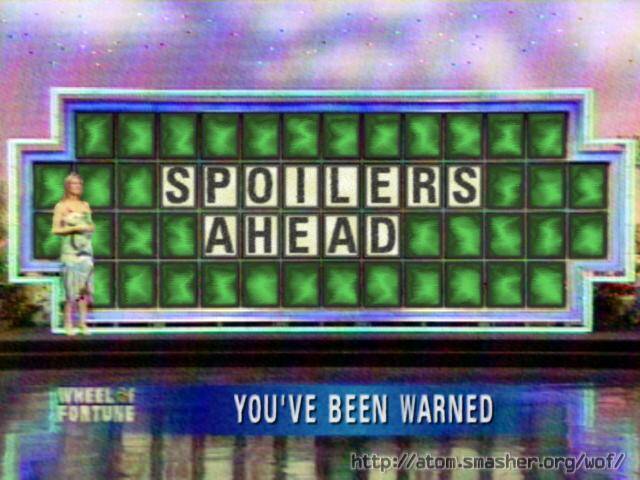This review is absolutely SPOILER-RIFFIC. You’ve been warned. If you want the short form: Watch this movie, then come read this review if you’re confused by the ending. It’s well worth the $5 to rent from Amazon.

I watched Happily (2021) yesterday, and … man, have I got thoughts.
First, don’t watch the trailer. Just… don’t. Watch the movie. Then come back.
This movie is a wild ride, with twists and twists and complications and “what the fuck” moments out the ass. The first twenty minutes had me in stitches and absolutely fascinated. I turned to my amour and said “Now they need to just not screw this up.”
And they… mostly didn’t?
See, here’s the thing. The first four acts (I think it’s a five-act structure; I didn’t count) are just absolutely fascinating. It’s inventive, it’s funny, it’s tense. The characters are well developed, and quickly. The basic premise – a couple who are still infatuated with each other after fifteen years incite resentment in their friend group – is a nice commentary on our fixation on romcoms. While Tom and Janet’s love is symbolized by their sexual attraction (and how they keep ACTING on that sexual attraction [1]) is pretty blatant, McHale and Bishé pull it off. The low-key sci-fi elements are well structured, and the reveals across the acts keep you guessing.
The last act of the movie (from the “just have a conversation” bit onward), initially came across as a jumbled mess – but that’s because I think the filmmakers tried to smash a little too much into this allegorical tale.
First, let’s address this: The (lack) of explanation of the sci-fi elements – the syringe, the undying man – is unsatisfying, but I think that’s deliberately so.
Second, the short vignettes – starting with when Tom and Janet (Joel McHale and Kerry Bishé) confront the mysterious man – are tonally all over the place.
And that’s because this movie is a reaction to both our current society and a couple-thousand year old manuscript.
The Book of Job.
It’s one of the stranger books in the Bible. Satan dares God to mess with one of his devoted followers to see if he’ll lose faith in God. God – for some reason – takes the bet, and proceeds to torture Job, destroy his family and his fortune, and utterly ruin Job. (In case you’re keeping track, this UTTERLY destroys the premise of prosperity theology, but hey, the Devil can quote scripture, right?)
When Job dares to ask God “WTF?”, God’s answer is insufferably pompous.
All through the book, Job had been hoping for an audience with God. He wanted some answers directly from the Almighty. The explanations from his friends connected his suffering with some sins (known or unknown) that he had committed. Job wants God to straighten this out. If Job is innocent, God should acquit him. If he is guilty, God should tell him what is the offense so that he can confess, change, and maybe end the suffering.
God does not declare Job innocent or guilty. God changes the subject and begins to talk about the wonders of the world that God had created. God formed the earth, set its structure, put bounds to keep the sea under control, created all the heavenly bodies, and even controls the weather. All through this speech, God reminds Job–using what sounds like sarcastic asides–that mere humans could never accomplish all of this.
https://www.enterthebible.org/Controls/feature/tool_etb_resource_display/resourcebox.aspx?selected_rid=533&original_id=38
Similarly, we see Tom and Janet – who are in a relationship that some people would kill to be a part of – have thier lives torn apart, and their friends (like the friends of Job) – try to tempt Tom and Janet away from thier love for each other.
A love for each other that – according to “Goodman” – is simply unnatural and a mistake.
Instead of an interrogation of God, we see five couples interrogate each other. They reveal all sorts of awfulness, all sorts of transgressions, all sorts of wrongness.
And most importantly, they reveal that Tom – despite thinking that he’d been given an injection that “fixed” his love and devotion to his wife – had never had a thing changed about him, and cheated on her anyway.
We could stop there. We could stop before the last act, when Tom and Janet confront “Goodman”. We’d have a cynical and pessimistic morality tale.
But we don’t. And that’s why this movie is messy as fuck, but also beautiful.
When “Goodman” is about to explain everything, Janet interrupts him and tells him that she just thinks he’s an asshole, regardless of his reasons. Tom echoes the sentiment. All the five couples drive away, and we are treated to a series of brief vignettes of all of them.
The abuser is shot by Gretel, his abusee. Nobody minds. Gretel finds love with Arthur, the other outcast. I approve, though there’s a bit of a strange “80’s romcom” vibe to it.
More importantly, every couple is seen making moves to reconcile. To get past the cheating, the lying, the deception, the heartbreak.
And most importantly, Tom and Janet – the perpetually horny and attracted to each other couple – pull over to the side of the road. There’s a moment where Janet clambers ontop of Tom, and he seems ready to pull back… but then instead leans into his attraction to his wife, and we see them again reconnecting with each other the way they had been before.
And that, my friends, is the key.
Because Tom and Janet do not give a fuck whether or not they’re “special”. They do not care about “Goodman”. They love each other, and they put the fucking work in. (Er, pun intended.) Likewise, we see each of the other couples take steps to make their relationships better – not because of what “Goodman” had done or said to them, not because of the revelations, but despite them.
Because there is no special “defect” that lets you have a wonderful life with your partner(s). Despite what “Goodman” has to say, despite whatever bullshit “Goodman” pulls, it all boils down to being kind to each other and loving each other as best you can.
We see this early on, where Tom is playing a video game in the morning, and in the evening says that he didn’t treat Janet well by asking her to make him an omelet… and makes up for it. They fucking forgive each other for their mistakes.
And despite what “Goodman” might say, it is not because of something “innate” in either Tom or Janet. We see Tom cheat, remember? We see them be short with each other.
They just decide that they’re going to be better than that, and follow through with it.
And at the end of the traumatic weekend, after “Goodman” has tortured all five couples, they all [2] decide that they’re going to be better anyfuckinghow. Not because of some supernatural/sci-fi entitity that operates on a “higher authority”. Not because of some crazy rare quality.
But just because they decide to.
And that’s inspiring as fuck.
It’s also a hell of a lot for a movie to lift in the fifth act, and Happily does a so-so job of it.
If I hadn’t realized the connection – if I’d not realized that this movie is a metaphor, that it was reflecting on the “Just deal with it, I’m God” aspect of Job, that it deals with the bullshit lesson of so many romcoms that some relationships are special because of the people rather than how people behave, I might have been upset. It might have been enough to make me really dislike this movie.
But with that realization, the fifth act – though clumsily executed – just accentuates the rest of the stellar performances and writing in the rest of the movie. It makes it all the more poignant and meaningful.
And it makes it a movie that has definitely made me think.
[1] Okay, asexual folks may have difficulty with this bit. Which, y’know, I get, sorta? Intellectually? Regardless, for me, it was a very powerful symbol of love, and I personally know more than a few people who are in the same boat as me.
[2] With the exception of the abuser, who again, I’m okay with him being shot and consider that growth on Gretel’s part.
